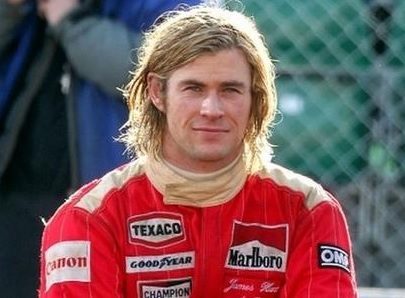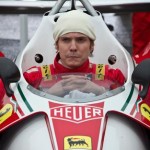Formula 1 isn’t often considered movie material for two main reasons: Firstly, recreating such high-speed action in a way that’s even close to reality is incredibly difficult, and secondly, these races last somewhere around 60 laps, and mainstream audiences aren’t going to pay just to see fake cars zoom around fake laps when they could simply watch the next Grand Prix. But every once in a while, the world of motor racing brings us a story so unbelievable we’d call it contrived if we didn’t know it was real, and Rush is a film that despite certain undeniable flaws, manages to tell such a story in a reasonably convincing manner.
In 1976 the rivalry between two drivers, Austria’s Niki Lauda and Britain’s James Hunt, came to a tense, unpredictable and, if I’m being honest, slightly horrific conclusion. With one driver whose technical knowledge was seemingly unparalleled and another who was naturally gifted, the racecourse was set for one of its most thrilling seasons. But when things took a sickening turn for the worst for Lauda, it sent the world of racing hurtling even further into the world’s eye. With such an inspiring — and perhaps more importantly, entertaining — story as base material, there has to be a focus on remaining faithful to both the people as well as the plot. In this sense, director Ron Howard doesn’t let them down, with a strong refusal to make either of the two more sympathetic than the other; after all, these aren’t stock characters, but real people, as endearing as they are irritating.
Daniel Brühl is entirely convincing as Lauda, bringing to life all the calculative perfectionist tendencies the driver was famous for, while maintaining a sense of humanity that reminds us every so often that he isn’t just a jerk. Chris Hemsworth, on the other hand, is unfortunately just a pretty boy in the role of Hunt, largely because the script doesn’t give him room to be much else. With his mainstream success as Thor, along with other commercial endeavors, he’s been pigeonholed into one role, and Rush isn’t any different; the film focuses far too much on the fact that Hunt was an arrogant ladies man — an “immortal” in bed (a nice little pun by screenwriter Peter Morgan) — and far too little on why this was the case. Any moments of true character development only exist when considering the enmity between the two, and even then this was largely exaggerated (in real life Hunt and Lauda were competitors, but also friendly, and even briefly roommates).
The pace of Rush varies greatly, occasionally hitting an excellent stride that balances action on the track with drama off it, but for the most part it makes the mistake of letting one aspect dominate for too long. Particularly as the film goes into its third act, it centers too much around the races; while to an extent this is understandable to provide the climactic outcome, this spotlighting of a singular element also means that the connections we formed with the characters earlier on quickly disappear, leading to a half-hearted, somewhat messy narration at the end in order to gain back some emotion points. While this may have the temporary effect of convincing audiences of its poignancy, even the slightest introspection will remind us that this resonance is provided more by the story — the one the filmmakers didn’t write — than by anything else.
Rush is an admirable film when considering its nature, with a clear drive of telling the story well while also maintaining a level of accuracy in terms of racing technicalities. For the most part, this works — people who don’t know F1 reasonably well aren’t going to realize that the Fuji track isn’t actually correct — and Howard does a wonderful job recreating the seventies; a particularly nice touch is his occasional inclusion of real footage from the time. But the fact remains that what could have been a thought-provoking film that changed the way we view the people inside these cars has instead been made into an advert for Formula 1 as fast and dangerous entertainment.






'Movie Review: Rush (2013)' have 11 comments
September 4, 2013 @ 1:13 pm RondoFrode
It’s still a month away for me
September 4, 2013 @ 1:41 pm CMerritt
Chris Hemsworth. ‘Nuff said. :)
September 4, 2013 @ 3:20 pm Opiate
I’d be lying if I said I wasn’t hoping for a better review.
September 6, 2013 @ 4:39 pm Pavi
Do you mean a better written review or a review that thought the movie was better?
September 7, 2013 @ 11:22 am Opiate
The latter.
September 4, 2013 @ 5:12 pm Parcel101
I caught an early showing of this. It would have been better had Howard given more focus to the inner demons Lauda and Hunt battled but he does do a great job capturing the on-track race stuff which should give racing fans something to smile about.
September 4, 2013 @ 8:18 pm Jar of Rice
My vote for best F1 movie goes to Senna.
September 6, 2013 @ 4:45 pm Pavi Ramani
Perhaps, but you have to bear in mind that Senna was much more of a documentary and relied heavily on archive footage – not necessarily easier overall but definitely easier to remain true to the story.
September 14, 2013 @ 4:16 pm Lights Camera Reaction
I’d probably rate it a little bit higher, but you make some interesting points. Especially, ” that the connections we formed with the characters earlier on quickly disappear, leading to a half-hearted, somewhat messy narration at the end in order to gain back some emotion points.”
The film is meant to be about Niki and James, and yet we never see them really interact until the film’s final scene. I wish Rush had gone a little deeper.
Still, it was enjoyable featuring a remarkable performance from Daniel Brühl.
Nice review!
September 18, 2013 @ 10:48 am Daxis
I’m a big fan of Ron Howard’s directorial work. Rush looks like one I’ll enjoy.
November 18, 2013 @ 1:11 am Akhenatron I
I agree Hemsworth’s acting came up short- especially when they were at an after party and by himself- an awful aTtempt at walking with a buzz. Bruehl was great- and this review was OK – i like the score- except- this is a racing movie- for you to write “they focused too much on racing” is a bit out of place. Enjoy